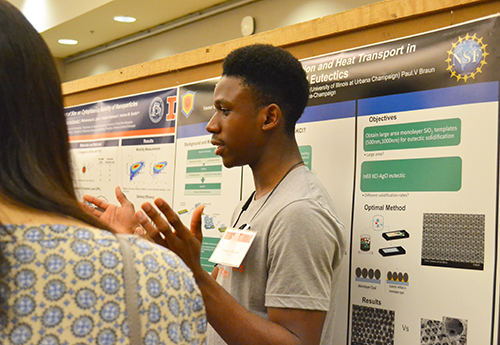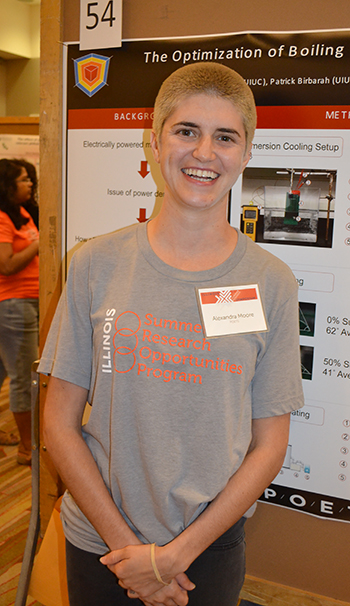POETS REU Fosters Innovative Thinking to Change the Future of Power Dense Electronic Systems
 POETS REU participant Andrew Reader presents his research during the Illinois Summer Research Symposium.
POETS REU participant Andrew Reader presents his research during the Illinois Summer Research Symposium. August 15, 2018
Ever wonder what the future of electronics could look like—say over the next decade? As part of the POETS (Power Optimization of Electro-Thermal Systems) ERC's 10-week, NSF-funded Research Experience for Undergraduates (REU), 15 students were able to explore the possibilities through authentic research experiences. Additionally, the students were exposed to a variety of educational programs that not only enhanced their knowledge base, and supplemented their research, but also exposed them to and prepared them for STEM careers.
All of these activities supported the overarching goal of POETS' REU, which Associate Director of Education and Inclusivity Jessica Perez says was to “provide a unique summer experience that encourages students to pursue graduate studies in engineering."
In addition, the program also sought to encourage REU students to become part of the POETS community beyond their summer experience. The goal was to assist students in building their STEM network of both mentors and peers that will grow and mature throughout students’ careers. The peer group would be comprised of students both at the undergrad's' home university and through virtual webinars.
Adds Perez, "We hope students return to their universities empowered by this experience to complete their STEM degrees, pursue other research-focused internships, and apply to graduate school."
 POETS REU undergrad Favour Obuseh presents his research.
POETS REU undergrad Favour Obuseh presents his research.In its third year, the POETS REU has grown significantly since it was begun. In its first two years, the program had 6 and 4 students, respectively. However, in 2017, POETS was awarded a three-year, NSF REU Site grant, which allowed the program to expand in the summer of 2018 to include 15 students spread across its four partner institutions: 4 at Illinois, the POETS lead institution; 5 at Arkansas; 4 at Stanford; and 2 at Howard. Also, because the POETS program is housed in multiple universities, every student had a unique experience because each university had access to different resources. This also meant that the REU students began and ended at different times depending on their institution’s schedule.
While the program's main emphasis was conducting research, students also participated in bi-weekly research seminars and professional development workshops. They also engaged in a variety of social and professional events, plus communicated their research progress at multiple venues. For instance, the REU participants at Illinois presented at the Illinois Summer Research Symposium. Participants will also get to present their research at POETS’ annual meeting in October.
What impact did POETS have on the undergrads? According to Perez, she's hopeful that "This experience was able to build students’ confidence in pursuing post-graduate STEM careers." She reports that the teams of multi-disciplinary POETS faculty and grad student mentors who worked with the students this summer were able to expose and train students in the research process.
Below are brief vignettes regarding two POETS REU participants at Illinois and their research experiences related to improving the efficiency of electrical systems.
Alexandra Moore
 POETS REU undergrad Alexandra Moore presents her research at the Illinois Summer Research Symposium.
POETS REU undergrad Alexandra Moore presents her research at the Illinois Summer Research Symposium. A sophomore studying Electrical Engineering at San Antonio College, Alexandra Moore came to Illinois to participate in the POETS REU because she wanted to gain some research experience. In fact, Moore had previously worked on a hydrogen fuel cell vehicle and was working on how to make it run more efficiently.
She explains how her participation in POETS seemed to be the next logical step: “We were concerned with being efficient, so now this was kind of the next step of efficiency, but on a much larger scale. I just felt like it was the next appropriate step to take because I do eventually hope to do research. I want to be a research engineer, and I would like to do it in this area of efficiency.”
Moore’s research focused on cooling down electronics for the purpose of improving power density in electrically powered mass transportation systems, which foreshadows what is to come for the industry.
She elaborates: “It's looking very much to the future. What [POETS] is trying to do is electric planes, electric buses, any mass transportation that can be electric. They're looking forward to the future and predicting, ‘Okay, one of the biggest issues is going be power density.' And where that threshold of how much power density it can handle is going to be based on how effectively can you cool down the electronics.’”
Moore has not yet had the chance to take any introductory engineering classes, so she admits that her experience was quite tough at first, as she often found herself reading numerous articles and doing extra research in order to get caught up in comparison to everyone else who had already taken those engineering courses.
She continued: “It was really cool, because I had to teach myself there and learn so much just so we could make a decision. I would say that was the hardest, but it was also the most exciting, because after a few weeks, I found I was able to get through the articles with a lot less struggle.”
While it is too early for Moore to decide whether she wants to go into the industry or to attend graduate school, she is absolutely certain her future will involve electrical-engineering-related research.
 POETS REU participant Ian Rivera-Colon explains his study to a visitor at the Illinois Summer Research Symposium.
POETS REU participant Ian Rivera-Colon explains his study to a visitor at the Illinois Summer Research Symposium. Ian Rivera-Colon
A super senior studying Mechanical Engineering at Interamerican University of Puerto Rico, Ian Rivera-Colon got involved with POETS because after participating in a different REU at Boise State University, he knew he wanted another research opportunity.
In fact, he knew he had to act quickly in order to be in the candidate pool for POETS and recalled his experience: “The funny thing was, I saw the ad like five days before the deadline, and I did it really quickly. I called my professors and said, 'I need a letter as soon as possible!'”
Rivera-Colon’s research was focused on determining the best way to cool a power dense system by figuring out how to optimize its components. Despite not going into depth with thermal analysis, which he says is the last step, he learned a lot about power dense systems.
Regarding his experience, Rivera-Colon says that it was difficult because he initially faced a language barrier. Plus, he had to learn how to work efficiently and independently since his graduate student mentor was busy defending his thesis. Despite these challenges, he maintains that he enjoyed his experience saying: “I really like the campus, the facility, and the POETS group has been great. They're really nice, and I really enjoy it here.”
For now, Rivera-Colon will likely go into the industry, but Illinois will definitely be on his radar when he applies for graduate school regarding a future involving engineering-based research.
Story by Brittany Rhed, I-STEM Undergraduate Worker. Photos by Elizabeth Innes, Communications Specialist, I-STEM Education Initiative
More: POETS, REU, Summer Research, Undergrad, 2018
For additional I-STEM articles about POETS, see:













.jpg)
















